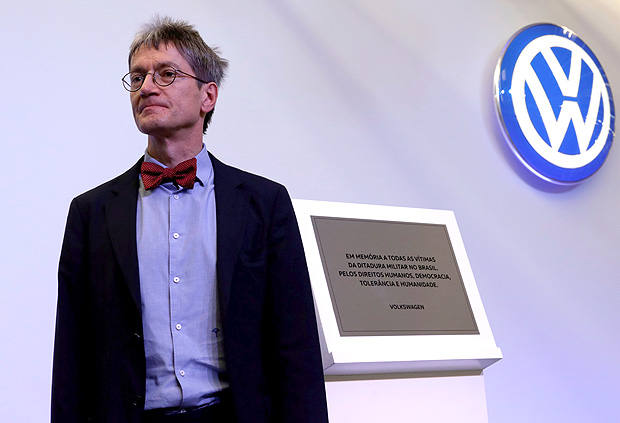Latest Photo Galleries
Brazilian Markets
13h46 Bovespa |
-0,34% | 123.740 |
16h43 Gold |
0,00% | 117 |
13h57 Dollar |
+0,53% | 5,2703 |
16h30 Euro |
+0,49% | 2,65250 |
ADVERTISING
Volkswagen Admits to Having Cooperated with Brazilian Dictatorship
12/15/2017 - 11h31
Advertising
MARCO RODRIGO ALMEIDA
FROM SÃO PAULO
A report that was requested by Volkswagen concluded that the security department of the Brazil affiliate cooperated with the country's military dictatorship.
The document also states, however, that no solid evidence was encountered to conclude that the company collaborated with the regime on an institutional level.
The report was released on Thursday (the 14th) at the German company's office in São Bernardo do Campo (São Paulo).
It was authored by German professor Christopher Kopper, who was hired by the automotive manufacturing company after former employees informed the National Truth Commission that political persecution took place.
"VW Brazil was entirely loyal to the Brazilian military regime and they shared the same objectives in terms of the economy and domestic politics. The correspondence with the headquarters in [German city] Wolfsburg demonstrated that until 1979 its support was unwavering and was not limited to personal declarations of loyalty", the report states.
The report points out that cooperation with the regime began in 1969, especially through the influence of the company's then head of security, Ademar Rudge, a former army official.
"Even though he would take action on his own, the company was tacitly aware [of his actions]. Since there was no legal obligation to report on those who expressed oppositionist views, he was entirely responsible for his own actions which he took out of sheer loyalty to the regime", the historian stated.
The security department monitored the activities of its employees and facilitated the arrests of at least seven of them.
"I did not find any evidence proving that management issued orders telling the security department to act the way it did", Mr. Kopper told the press.
According to him, the head office in Germany had remained uninterested in the events that were taking place in Brazil. That changed in 1979 when workers in the automotive industry, led by then union leader Luiz Inácio Lula da Silva, went on strike.
From that moment onward, the automaker not only implemented a new style of management that revolved around democratic values but also instructed its affiliate to set up a commission designed to hear out its employees.
Translated by THOMAS MATHEWSON
Read the article in the original language
| Paulo Whitaker/Reuters | ||
 |
||
| Christopher Kopper, a history professor at Germany's Bielefeld University, attends a ceremony during which he presented his study on Volkswagen's role in Brazil from 1964 to 1985 |



